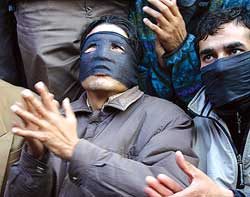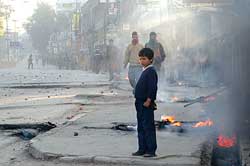 Political parties and their affiliated student leaders intensified street protests this week, accusing security forces of brutal crackdowns. The government responded by putting army and police under a unified command to meet the escalating protests.
Political parties and their affiliated student leaders intensified street protests this week, accusing security forces of brutal crackdowns. The government responded by putting army and police under a unified command to meet the escalating protests. The streets of Kathmandu looked like a war zone with burning tyres and vehicles. On Thursday, the student unions declared a bandh in Lalitpur and Banke districts. Students and teachers, unaware of the bandh, were caught in cars that were stoned in Patan. Dozens of other vehicles were damaged. In Nepalganj, hundreds of bus passengers were stranded at the Indian border.
As pro-republican protests intensified, King Gyanendra himself was conferred the title 'Emperor of the World's Hindus' by the World Hindu Federation (WHF) last Friday. The federation has chapters in 22 countries and its current president is Nepal's Gen Bharat Keshar Simha. "His Majesty, as a new king, has honoured us by accepting the title from the world's one billion Hindus," Simha told us.
 Political parties were angered by an interview in Time magazine by King Gyanendra this week. In it, the king reiterated his commitment to democracy and the constitution. But political leaders said the king's comments were "unconstitutional", and took umbrage at his sentence: "The reality is: the people of Nepal want to see their King, they want to hear from him."
Political parties were angered by an interview in Time magazine by King Gyanendra this week. In it, the king reiterated his commitment to democracy and the constitution. But political leaders said the king's comments were "unconstitutional", and took umbrage at his sentence: "The reality is: the people of Nepal want to see their King, they want to hear from him." A palace insider was puzzled by the criticism: "It is knee-jerk over-reaction," he said. NC president Girija Koirala warned the protests would be intensified. Ex-Indian prime minister Chandra Shekhar's meetings with Koirala and the king this week doesn't seem to have doused the flames. "I can't tell you what was discussed, they can if they want," he said before leaving on Thursday.
Meanwhile, the Royal Nepali Army has responded to criticism of its human rights record by saying it has punished 25 officers, including a major, for violations. Fifteen got jail sentences, and others were either discharged or demoted.


